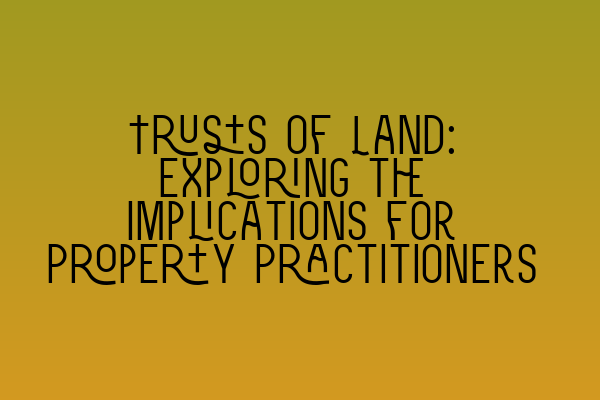Trusts of Land: Exploring the Implications for Property Practitioners
As a property practitioner, it is essential to have a thorough understanding of the intricacies surrounding trusts of land. Trusts of land play a significant role in property law, and being well-versed in this area can greatly enhance your career and ensure better outcomes for your clients. In this blog post, we will delve into the concept of trusts of land, explore its implications, and provide insights on how to navigate this complex area effectively.
What are Trusts of Land?
Trusts of land, as the term suggests, pertain to legal arrangements where land or property is held in trust. In such cases, the legal ownership of the land is separated from its beneficial ownership. The legal owner, also known as the trustee, holds the land on behalf of one or more beneficiaries who have the right to enjoy the benefits and income generated by the land.
The Implications for Property Practitioners
Understanding and working with trusts of land is crucial for property practitioners. Whether you are involved in conveyancing, real estate transactions, or property disputes, the presence of a trust can significantly impact the work you undertake. Some of the key implications for property practitioners include:
1. Conveyancing:
When dealing with a property held in trust, it is vital to identify the trust and its terms before proceeding with the conveyancing process. This involves conducting thorough due diligence to ensure that all necessary consents, permissions, and obligations are considered. Failing to do so can lead to legal complications and potential liability for negligence.
2. Property Disputes:
Trusts of land can be a common source of property disputes. This can arise when beneficiaries are in disagreement with the trustee or when multiple beneficiaries have conflicting interests. As a property practitioner, you may be called upon to resolve such disputes. Having a comprehensive understanding of trusts of land will enable you to offer accurate advice and negotiate fair resolutions.
3. Estate Planning:
Trusts of land are often used in estate planning to ensure the smooth transfer of assets and to mitigate tax liabilities. As a property practitioner, you may be involved in drafting trust documents or assisting clients in structuring their estate plans. Having a solid grasp of trusts of land will enable you to provide expert advice and tailor solutions that align with your clients’ objectives.
Navigating Trusts of Land Effectively
To navigate trusts of land effectively, property practitioners should:
1. Stay Up-to-Date:
Property law is continually evolving, and legislation related to trusts of land can change over time. It is crucial to remain updated on the latest developments, case law, and statutory provisions to ensure accurate advice and effective representation for your clients.
2. Seek Specialist Advice:
If you encounter complex trust-related issues, it is recommended to seek advice from specialist property lawyers who have expertise in trusts of land. Collaborating with experienced professionals can help you navigate intricate situations with confidence and ensure the best outcomes for your clients.
3. Expand Your Knowledge:
Enhancing your knowledge and skills in trusts of land can set you apart as a property practitioner. Consider enrolling in SQE (Solicitors Qualifying Examination) preparation courses that cover trusts of land and related topics. Such courses can help you deepen your understanding, develop practical skills, and prepare for the professional challenges you may face.
Conclusion
Trusts of land are a crucial aspect of property law that property practitioners must grasp to provide effective advice and representation to their clients. By understanding the implications and intricacies of trusts of land, you can enhance your career and ensure better outcomes for your clients. Stay updated, seek specialist advice when needed, and invest in expanding your knowledge through relevant courses to become a well-rounded property practitioner.
Related Articles:
– SQE 1 Practice Exam Questions
– SQE 1 Practice Mocks FLK1 FLK2
– SQE 2 Preparation Courses
– SQE 1 Preparation Courses
– SRA SQE Exam Dates
